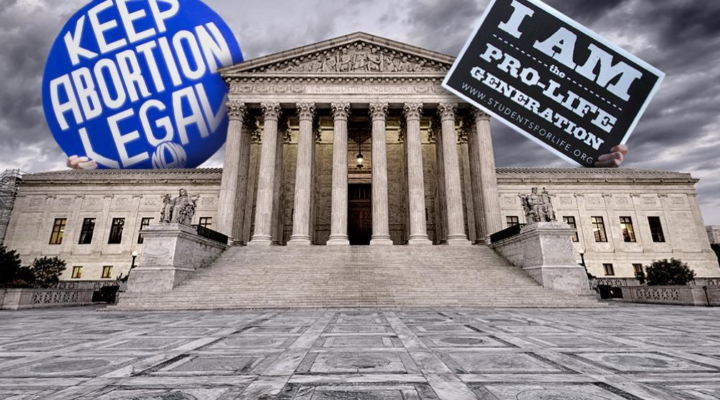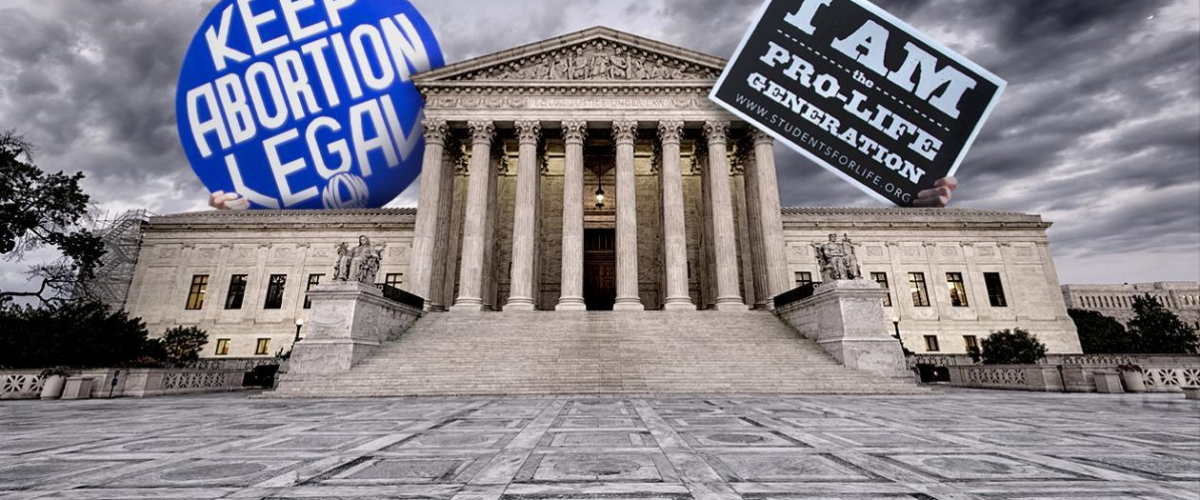Abortion presents a profound moral issue on which Americans have hotly contested emotional arguments. When it comes to the 2024 election, a Kaiser Family Foundation poll finds women of reproductive age (18 to 49), Black women and women who live in states with abortion bans are more likely to rank abortion as the single most important issue influencing their vote this November.
That’s bad news for Republicans who, influenced by conservative evangelicals, have made an anti-abortion crusade the centerpiece of their politics for decades. Now, an anti-anti-abortion mentality is motivating a different set of voters: 28% of Black women, 19% of women living in states where abortion is banned, and 17% of women who are under age 50.
This introduces a new variable into the abortion debate.
“Abortion voters are young, Black women — and not white evangelicals.”
“It’s a complete shift,” said Ashley Kirzinger, a KFF pollster. “Abortion voters are young, Black women — and not white evangelicals.”
I browsed more than 125 articles depicting support for less-restrictive laws on abortion than America and its states have in a post-Roe world. The question arises: Have conservatives crossed the Rubicon, meaning a “point of no return“?
Republicans are paying attention and second-guessing one another.
Kellyanne Conway has told Republicans to “flip the script and accuse Democrats of extremism while advocating for policies she views as a compromise, such as a ban on the procedure after 15 weeks with exemptions for rape, incest and threats to the life of the mother.”
No matter how ardently conservatives push the idea of occupying the moral high ground, how much they emotionally bombard Americans for not outlawing all abortions, people are feeling oppressed by anti-abortion measures. Even righteousness, when shoved down the throat, becomes oppressive.
The extreme element of the “pro-life” movement embodies raw power. They are the next oppressor in a long line of oppressors. As agents of a political party determined to control everything, they are a stand-in for the abuse of power.
But in the rush to a universal ban on all abortion, the pro-lifers are losing momentum. Their unwillingness to compromise, to work out solutions less than total, causes pro-life activists to push harder, demand more and insist on total victory.
The anti-abortion movement is the radical part of the evangelical movement because it correlates with authoritarianism as a kind of propaganda that insists the only two options are winning or losing.
What we are witnessing now is that this likely will not end well for Republicans, who have overplayed their hand. An unmitigated quest for power by enacting a total abortion ban may push us into the abyss.

Black Church to the forefront
One of the forces capable of supporting women’s rights is the African American church and the women who are a major part of that tradition. Since more Black women live in states that will likely ban abortion, and especially Southern states, they will bear the harshness of the ban.
Black women are three times more likely to die from pregnancy-related complications than their white counterparts within the United States. According to the CDC, disparities in standards of care, structural racism and implicit bias are leading contributors. And these statistics extend beyond maternal care to broader inequities within health care systems.
“Basic needs, practical needs, eating, clothing, housing, employment, being impacted by violence is just as important,” said Cherisse Scott, CEO and founder of SisterReach. “We need to think of how we seize this moment as a way forward to not abandon people but to continue to center the full breadth and depth of their lived experiences.”
In Mississippi, for example 38% of the population is African American. Add to this that Black women are four times more likely to have abortions than white women. The lack of health care for Black women, a race-related issue, complicates the picture even more. According to KFF, in Mississippi, Black women accounted for 74% of abortions in 2019.
“Abortion is not an abstract issue decided by scattered biblical verses; it is a flesh and blood, bodily issue with lives hanging in the balance.”
Abortion is not an abstract issue decided by scattered biblical verses; it is a flesh and blood, bodily issue with lives hanging in the balance.
Thus I don’t for a second believe it is ironic that African American women are rising to meet this oppression with a growing opposition. They know oppression; it’s in their veins. They still carry the scars of slavery and the discrimination of segregation in their bodies and spirits.
The idea of starting a discussion about abortion with African American women encourages me for one reason: Christian Black women confess to struggling with opposition to abortion and lawmakers (mostly white men) telling them what their choices are. As 22-year-old Eugenia Osei testifies, “Women in the church — a lot of us are strong in our faith. So why, you know, judge us and put us down over something that one, we might need to do, or two, it’s our right to do it?”
Other church women have expressed disappointment in the Supreme Court overturning Roe.
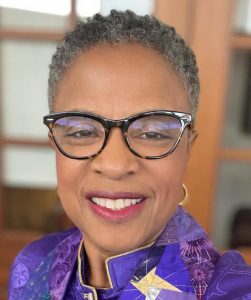
Bishop Yvette Flunder
Bishop Yvette Flunder says she believes all pregnant people should have access to abortion: “I’m a person who is pro a woman’s right to choose, but I’m also pro having a community in place if that person wants to give birth.”
The tensions involved for people of faith create grey areas not amenable to the dualism of much of the church’s insistence that abortion is immoral. There are Black churches supporting the right to abortion. Ebenezer Baptist Church, where Sen. Raphael Warnock is senior pastor, is one such church. Warnock says, “To be anti-abortion does not make you pro-life. Especially if you will not stand up for the lives of our children once they are here.”
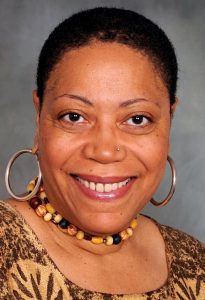
Toni Bond
Toni Bond, an ethics and theology scholar, says Black faith leaders need to make their voices heard in the fight for abortion access.
“We definitely need to heighten our work at the intersections of religion, faith and reproductive justice,” Bond said in the recent virtual roundtable held by nonprofit SisterReach. “We’ve been afraid to talk about that, so we have basically allowed anti-choice conservative fundamentalist folks” to lead the conversation.
These are some of the positive indications that the Black church and Black women will step up to provide more justice and less judgment.
African American Women of Faith for Justice
There is an honored tradition in the Black church for organizing and creating collective political power for Black communities, from abolition in the 19th century to the Civil Rights Movement of the 1960s. This solid tradition has every opportunity to make a difference in 2024.
As Joyce Ladner notes, historically Black women, especially poor Black women in rural areas, have had to fulfill social roles not commonly played by more privileged women. Zora Neale Hurston called Southern Black women the mules of the world; they did whatever needed doing.
Historian Charles M. Payne, in his I’ve Got the Light of Freedom: The Organizing Tradition and the Mississippi Freedom Struggle, does a magisterial work of scholarship lifting the voices and power of the African American women in the Civil Rights Movement.
Civil rights icon Fannie Lou Hamer famously said, “I’m sick and tired of being sick and tired.” Hamer was fired from her job as a maid, she was arrested and beaten in the Winona, Miss., jail. She was such a powerful public speaker Lyndon Johnson once called a news conference solely to stop television coverage of her.
There’s a Hall of Fame for the often ignored women of the Civil Rights Movement: Ella Baker, Diane Nash, Mary McLeod Bethune, Dorothy Height, Joe Ann Robinson, Dexter Avenue Baptist Church; Coretta Scott King, Pauli Murray, Daisy Bates, Ruby Bridges, Septima Clark, Shirley Chisholm, Elaine Brown, Angela Davis. And as the unknown writer of the epistle to the Hebrews says: “And what more should I say? For time would fail me to tell of (those) through faith conquered kingdoms, administered justice, obtained promises, shut the mouths of lions, quenched raging fire, escaped the edge of the sword, and won strength out of weakness.”
This year, conservatives don’t face a language problem; they face an African American woman problem.
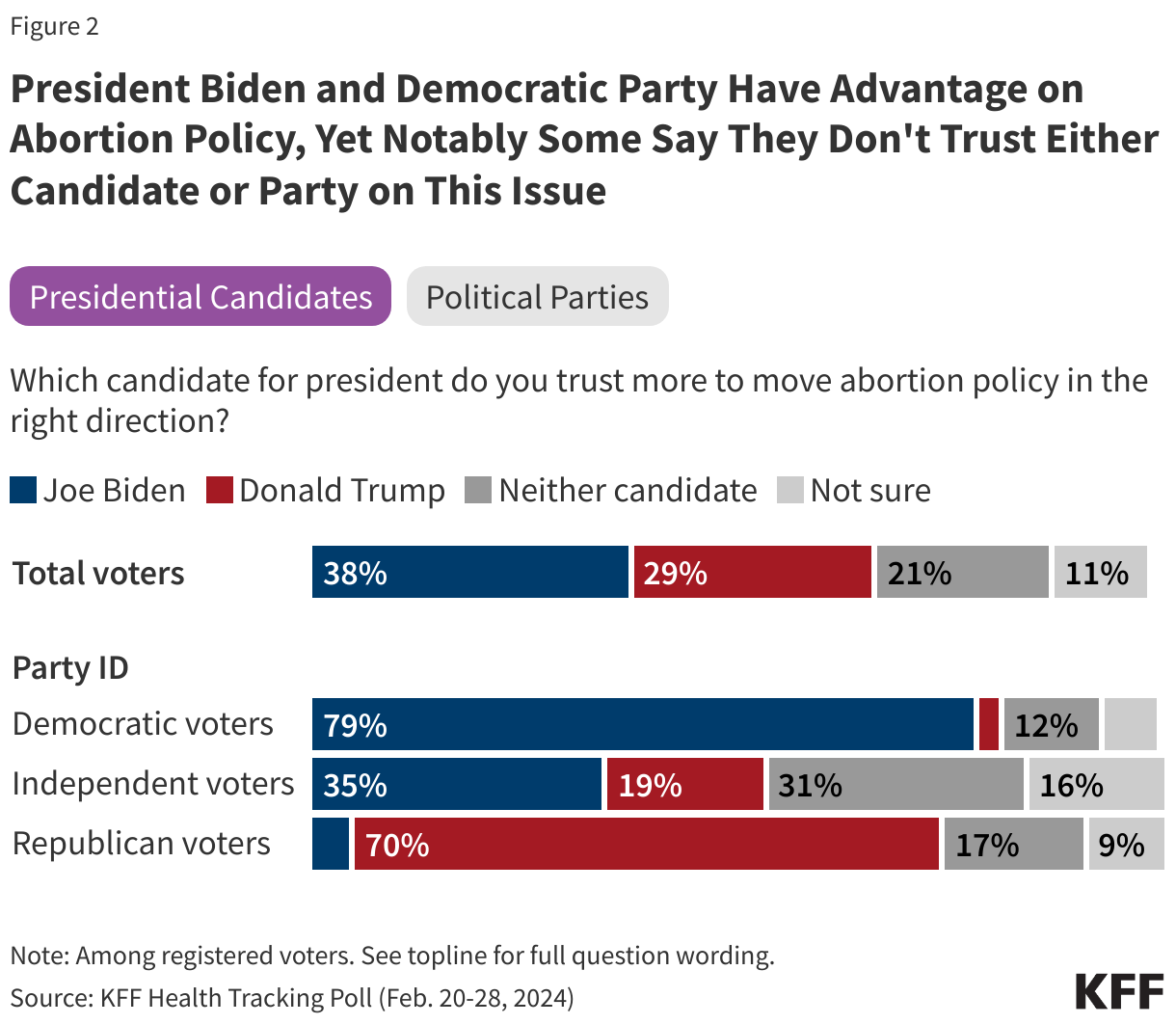
A freedom issue
There is a second force, a philosophical force, that also doesn’t bode well for conservatives: freedom. The strictness of the post-Roe movement flies in the face of American love for complete freedom. In the face of 75% of Americans favoring some access to abortion with certain restrictions, the anti-abortion movement looks like an authoritarian monstrosity willing to use the law to violate the will of the people.
Freedom, among conservatives, has become a Christian virtue. We live in a time where the demand for individual freedom never has been stronger — or more dangerous. This demand for total freedom threatens to make it impossible to organize a sane, collective democratic response to the challenges facing us as a people.
“Evangelicals are stuck in an epistemological crisis — a love of authority over others and a desire for total freedom.”
Evangelicalism involves a fantasy of freedom. They want freedom of a sort, but what they most crave is the freedom to legislate morality and moral/ethical decisions. And they seek this power as the self-appointed spokespersons of God, the true Christians with the Christian worldview.
There’s an attitude of individualism and consumerism turning freedom into a complex term of confusion.
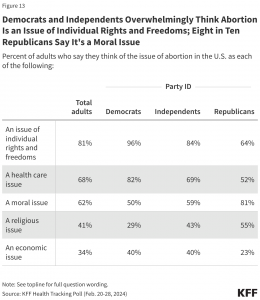 On the one hand, evangelicals ask, “Who are you to tell me I can’t have worship during COVID?” and “Who are you to tell me I can’t have prayer in public schools?” At the same time, they want the freedom to restrict abortion to the point of totally outlawing it. If a woman asks, “Who are you to restrict my right to an abortion?” evangelicals desert the principle of freedom in favor of the authoritarianism they embrace with such zeal.
On the one hand, evangelicals ask, “Who are you to tell me I can’t have worship during COVID?” and “Who are you to tell me I can’t have prayer in public schools?” At the same time, they want the freedom to restrict abortion to the point of totally outlawing it. If a woman asks, “Who are you to restrict my right to an abortion?” evangelicals desert the principle of freedom in favor of the authoritarianism they embrace with such zeal.
I believe evangelicals are stuck in an epistemological crisis — a love of authority over others and a desire for total freedom.
Combine abortion with African American women, women of faith of all colors, the churches and you have a rising tide of discontent refusing to allow authoritarian conservatives to dictate the values that will define our nation.
Conservatives have been duly warned. African American women, with courage to stand against oppressors in their DNA, the overreach of conservative politicians, and the desire for true freedom will turn conservative dreams of an abortion-free nation into a conservative fantasy.
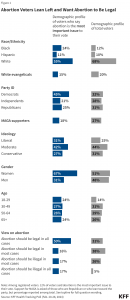 Rodney W. Kennedy is a pastor and writer in New York state. He is the author of 10 books, including his latest, Good and Evil in the Garden of Democracy.
Rodney W. Kennedy is a pastor and writer in New York state. He is the author of 10 books, including his latest, Good and Evil in the Garden of Democracy.
Related articles:
SBC agency vows to ‘advocate for the complete end of abortion’ in America | Analysis by Mark Wingfield
Just the facts on abortion attitudes | Analysis by Robert P. Jones
Abortion now more important to Democrats than Republicans as a voting essential

